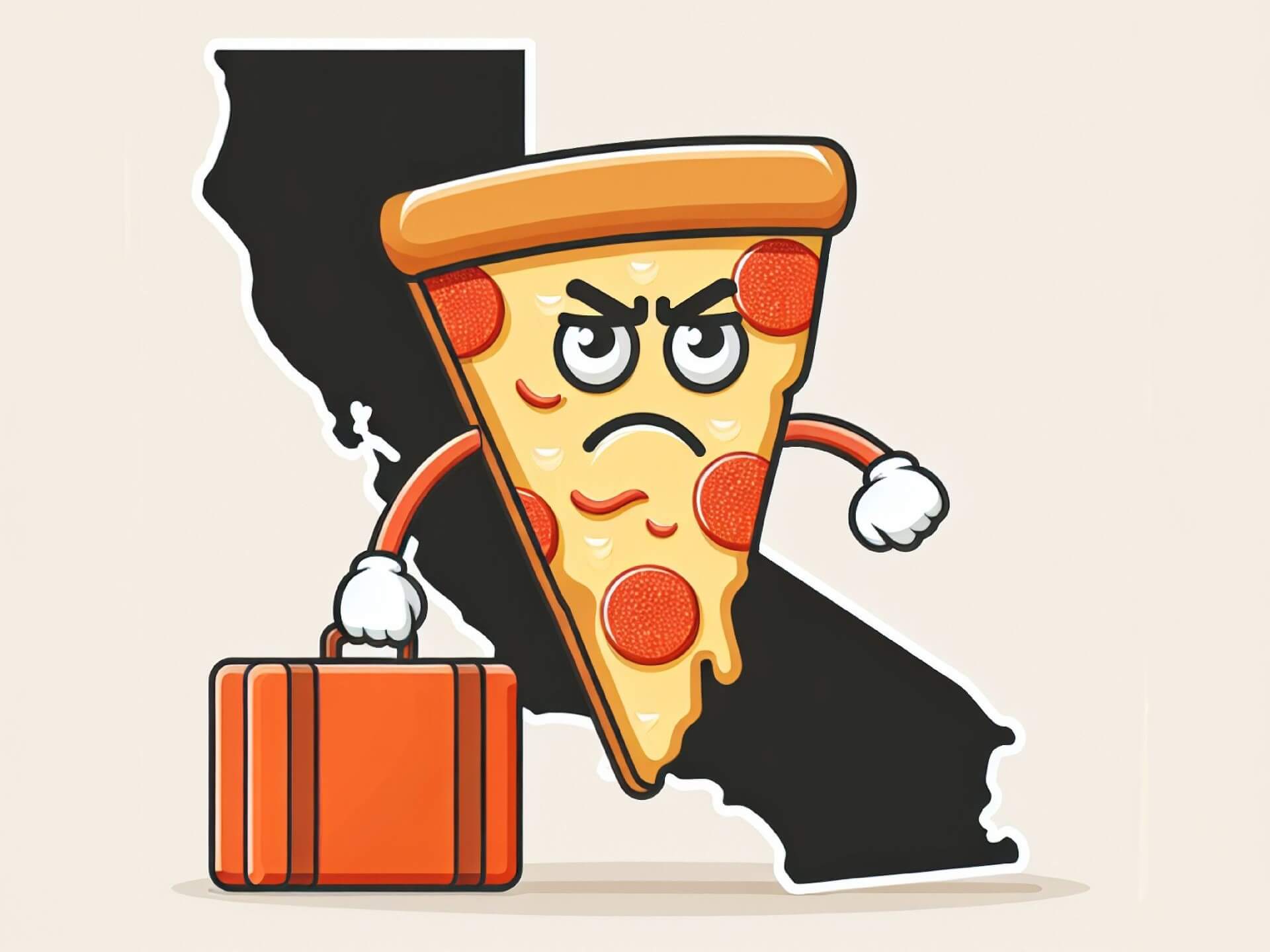FAST Act Fallout far from Finished
by David Klemt

Have you ever seen a more frustrated slice of pizza in your life? I doubt it.
The battle over the implementation of California’s FAST Act appears to be heating up further, with multiple parties attempting to land blows on one another.
Depending on the source, the Golden State’s fast-food minimum-wage hike to $20 per hour is either killing jobs or adding them. One side says that limited-service and quick-service restaurants have shed nearly 10,000 jobs since Governor Gavin Newsom signed the FAST Act into law.
On the other side, proponents are pointing to data the Bureau of Labor Statistics (BLS) released recently to paint the situation in a better light. According to this data, LSRs in California added 4,500 jobs between September of last year and April of this year.
However, those unhappy with the FAST Act have downplayed this net gain in fast-food jobs. According to reports, that increase in jobs represents a recurring seasonal trend. Further, some sources claim that the data showing a gain in jobs includes restaurants other than LSRs, so the information is being spun to look positive.
One group is so unhappy with Gov. Newsom’s implementation of the FAST Act, they released an obituary-style ad to make their grievance known.
“In Memoriam”
Below, a social media post displaying the “in memoriam” ad from the California Business and Industrial Alliance (CABIA).
📢 Today, we called out @GavinNewsom in a full-page ad in USA Today for the harmful impact of California’s recent minimum wage hike on fast-food restaurants. Nearly 10,000 jobs lost since AB 1228 was signed into law. CA deserves better policies that support growth and stability.… pic.twitter.com/CCpAk3L2j0
— @cabia (@cabia_speakup) June 6, 2024
The full-page ad is available for viewing here.
Jonathan Maze, editor-in-chief of Restaurant Business, also spoke out against California’s $20 minimum wage for fast-food workers.
During an appearance on FOX & Friends First, Maze addressed how the state handled the pay hike.
“You’ve got two issues, really. You have the fact that it was done almost overnight,” said Maze. “You have the fact that it was a 25-percent increase in the wage rate. Both of those things happening simultaneously, is a really hard thing for restaurants’ bottom line, and you’re seeing the effects of it.”
Brand Relocation
In a development that won’t assuage Gov. Newsom’s critics, a California-born fast-food brand has announced it’s leaving the state.
Blaze Pizza, which opened its first location in Irvine, California, in 2012, has announced the relocation of its headquarters to Atlanta, Georgia. Currently, the brand’s headquarters is located in Pasadena. The move will take place later this year, and it’s not expected to impact the company’s roughly 7,500 employees.
It will, however, impact Blaze Pizza’s taxes. Moving to Atlanta will reduce the QSR’s corporate tax rate by at least a third.
This begs a couple questions: Is this simply a business-savvy move that will reduce Blaze’s taxes and allow it to allocate more resources to further the brand’s growth? Or did the brand analyze the FAST Act’s impact on its bottom line and decide to flee the state for greener pastures?
One can argue the situation is closer to the former than the latter, as Blaze has stated that store-level employees won’t be impacted by the reorganization.
But on the other side of the coin, one can argue the move to Atlanta is a direct response to FAST. Cutting taxes by a third (if not more) may help Blaze avoid restaurant-level job cuts or store closures.
Messy
One thing is mostly clear regarding California and the FAST Act: the situation, so far, is messy.
The tendency is usually to say that as things play out, data will tell the tale. Unfortunately, as this situation is showing us, that’s not always the case. Data is being spun to support agendas.
One thing I’ll say is that I’m happy some fast-food workers’ lives are improving. Or, at least their wages have gotten better. But, of course, if their employers are cutting hours or eventually closing stores, is that improvement sustainable?
And then there are the guests. Reports appear to indicate that more and more Americans now perceive fast food to be a luxury. That doesn’t bode well for LSRs and QSRs in California in particular, nor for fast-food operators across the US.
This situation is complex, with many factors impacting California’s restaurant workers, operators, and guests. We likely won’t know the true impact of the FAST Act until the end of this year, at the earliest.
Other states looking at implementing similar measures should keep their eyes trained on California before moving forward. Legislators need to meet and actually listen to independent and chain operators, along with people representing the workers in good faith.
Image: Shutterstock. Disclaimer: This image was generated by an Artificial Intelligence (AI) system.


